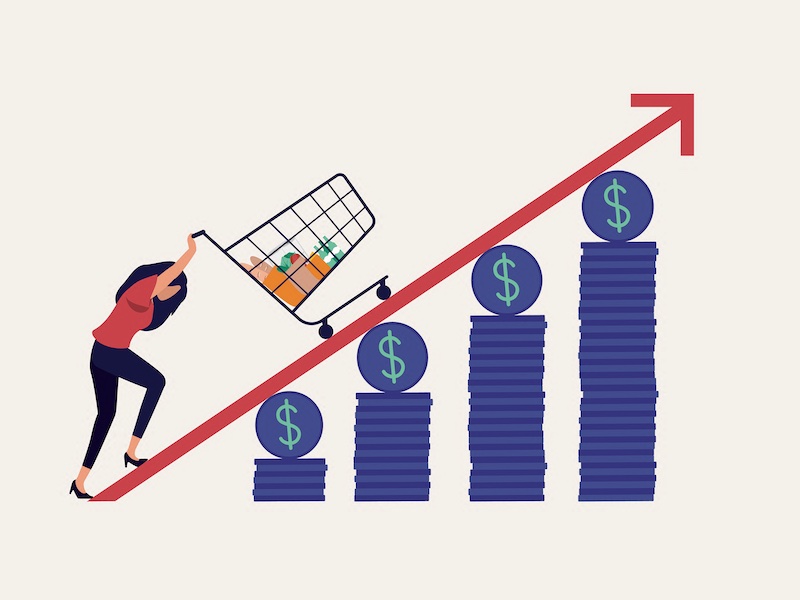
Bank of Canada deputy governor Nicolas Vincent says businesses raising their prices more frequently than they did before the pandemic is contributing to higher-than-expected inflation.
Vincent made the comments Tuesday in his first speech as external non-executive deputy governor, a newly created role, to the Chamber of Commerce of Metropolitan Montreal.
In prepared remarks for his speech, which was delivered primarily in French, Vincent said price increases have been larger than normal and more frequent than before the pandemic — a trend that has persisted.
“We believe that this behaviour by firms — both here and abroad — is intimately linked to the stronger-than-expected inflation we’ve seen,” Vincent said.
The annual inflation rate fell to 2.8% in June, but rebounded to 4.0% in August as economists expect a long road ahead to reaching the central bank’s target of 2%.
In ordinary times, Vincent noted that raising prices too frequently can be costly to businesses and “can antagonize customers.”
But rising costs and robust demand may be changing the calculation for businesses, he said, making it easier to raise prices in a volatile economic environment.
“Under these conditions, we may expect firms to have larger and more frequent price adjustments,” Vincent said.
“This could be part of the reason why the models that central banks use haven’t fully captured the recent effects of supply-demand imbalances on inflation. The most commonly used models weren’t built to capture a change in a firm’s behaviour.”
Although pricing behaviour by firms has been shifting closer to normal since the beginning of the year, the deputy governor said that progress has been slow.
In an email, BMO chief economist Douglas Porter said discussing corporate pricing is like talking about the effect of higher prices, rather than the cause.
“To me, you have to ask, ‘How and why did corporate pricing behaviour change?”’ Porter wrote. “The answer is fairly apparent: Demand far outstripped supply, and to adjust pricing policies we need to narrow that gap.”
But economist Jim Stanford, who has long attributed the rise in inflation to high corporate profits, was happy to see the Bank of Canada discuss the role businesses have had in keeping inflation elevated.
“I am going to give the bank credit for acknowledging that corporate pricing is an independent and important determinant of what’s been happening with inflation,” he said.
Corporate profits have drawn a lot of attention post-pandemic, as some people have questioned the fairness of rising profits during a period of high inflation.
The NDP has been especially critical of these high profits, blaming corporations for high inflation and called on the federal government to implement windfall taxes.
Meanwhile, the governing Liberals have also singled out the country’s major grocers for rising prices, calling on them to present a plan to stable prices by Thanksgiving, or face consequences.
Recent research from the central bank shows price increases have closely mirrored the cost increases businesses have faced. However, Vincent notes that even stable profit margins would mean customers are carrying the entire burden of higher prices.
The deputy governor says these recent discoveries about the affect pricing behaviour may be having on inflation is leading the Bank of Canada to rethink its assumptions about what drives inflation.
“The impact of our recent discoveries shouldn’t be underestimated. They force us to revisit some of the assumptions we make in our economic models as well as question the relationship between inflation and its drivers,” he said.
Vincent outlined some risks to the inflation outlook associated with the abnormal corporate pricing. The deputy governor said higher labour and financing costs could continue to push prices up. He also noted that the unusual pricing behaviour could be “sticky.”
“Firms might continue to make larger and more frequent price changes even when many of the factors driving those changes have gone away,” he said.
That could be due to new technology — namely electronic price tags — making it easier to raise prices, and consolidation in some industries may be reducing the competitive pressures that make it harder to raise prices, the deputy governor said.
“Perhaps the biggest risk of all is the idea that recent pricing behaviour could become self-perpetuating,” Vincent told the business audience. “If you continue to expect your suppliers and competitors to make frequent price changes, you might be more prone to do the same yourself, creating a feedback loop.”